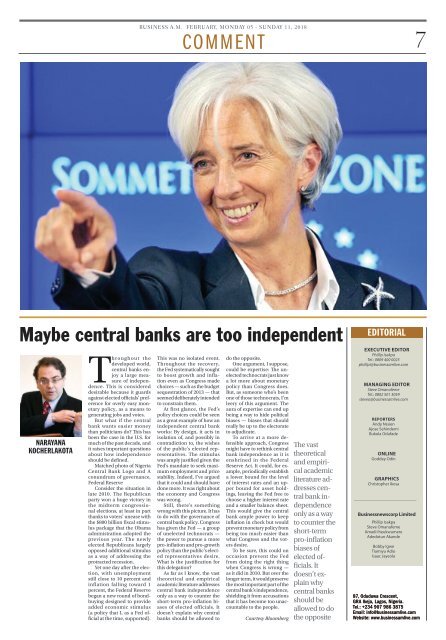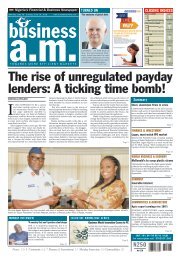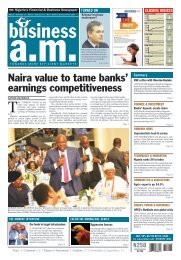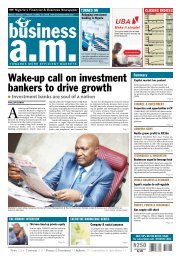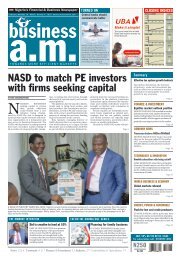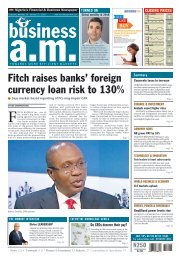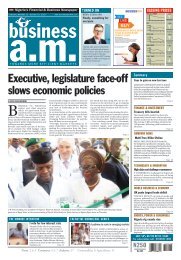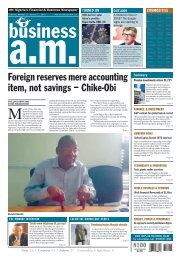Create successful ePaper yourself
Turn your PDF publications into a flip-book with our unique Google optimized e-Paper software.
BUSINESS A.M. FEBRUARY, MONDAY <strong>05</strong> - SUNDAY 11, 20<strong>18</strong><br />
COMMENT<br />
7<br />
Maybe central banks are too independent<br />
EDITORIAL<br />
NARAYANA<br />
KOCHERLAKOTA<br />
Throughout the<br />
developed world,<br />
central banks enjoy<br />
a large measure<br />
of independence.<br />
This is considered<br />
desirable because it guards<br />
against elected officials’ preference<br />
for overly easy monetary<br />
policy, as a means to<br />
generating jobs and votes.<br />
But what if the central<br />
bank wants easier money<br />
than politicians do? This has<br />
been the case in the U.S. for<br />
much of the past decade, and<br />
it raises important questions<br />
about how independence<br />
should be defined.<br />
Matched photo of Nigeria<br />
Central Bank Logo and A<br />
conundrum of governance,<br />
Federal Reserve<br />
Consider the situation in<br />
late 2010. The Republican<br />
party won a huge victory in<br />
the midterm congressional<br />
elections, at least in part<br />
thanks to voters’ unease with<br />
the $800 billion fiscal stimulus<br />
package that the Obama<br />
administration adopted the<br />
previous year. The newly<br />
elected Republicans largely<br />
opposed additional stimulus<br />
as a way of addressing the<br />
protracted recession.<br />
Yet one day after the election,<br />
with unemployment<br />
still close to 10 percent and<br />
inflation falling toward 1<br />
percent, the Federal Reserve<br />
began a new round of bondbuying<br />
designed to provide<br />
added economic stimulus<br />
(a policy that I, as a Fed official<br />
at the time, supported).<br />
This was no isolated event.<br />
Throughout the recovery,<br />
the Fed systematically sought<br />
to boost growth and inflation<br />
even as Congress made<br />
choices — such as the budget<br />
sequestration of 2013 — that<br />
seemed deliberately intended<br />
to constrain them.<br />
At first glance, the Fed’s<br />
policy choices could be seen<br />
as a great example of how an<br />
independent central bank<br />
works: By design, it acts in<br />
isolation of, and possibly in<br />
contradiction to, the wishes<br />
of the public’s elected representatives.<br />
The stimulus<br />
was amply justified given the<br />
Fed’s mandate to seek maximum<br />
employment and price<br />
stability. Indeed, I’ve argued<br />
that it could and should have<br />
done more. It was right about<br />
the economy and Congress<br />
was wrong.<br />
Still, there’s something<br />
wrong with this picture. It has<br />
to do with the governance of<br />
central bank policy. Congress<br />
has given the Fed — a group<br />
of unelected technocrats —<br />
the power to pursue a more<br />
pro-inflation and pro-growth<br />
policy than the public’s elected<br />
representatives desire.<br />
What is the justification for<br />
this delegation?<br />
As far as I know, the vast<br />
theoretical and empirical<br />
academic literature addresses<br />
central bank independence<br />
only as a way to counter the<br />
short-term pro-inflation biases<br />
of elected officials. It<br />
doesn’t explain why central<br />
banks should be allowed to<br />
do the opposite.<br />
One argument, I suppose,<br />
could be expertise: The unelected<br />
technocrats just know<br />
a lot more about monetary<br />
policy than Congress does.<br />
But, as someone who’s been<br />
one of those technocrats, I’m<br />
leery of this argument. The<br />
aura of expertise can end up<br />
being a way to hide political<br />
biases — biases that should<br />
really be up to the electorate<br />
to adjudicate.<br />
To arrive at a more defensible<br />
approach, Congress<br />
might have to rethink central<br />
bank independence as it is<br />
enshrined in the Federal<br />
Reserve Act. It could, for example,<br />
periodically establish<br />
a lower bound for the level<br />
of interest rates and an upper<br />
bound for asset holdings,<br />
leaving the Fed free to<br />
choose a higher interest rate<br />
and a smaller balance sheet.<br />
This would give the central<br />
bank ample power to keep<br />
inflation in check but would<br />
prevent monetary policy from<br />
being too much easier than<br />
what Congress and the voters<br />
desire.<br />
To be sure, this could on<br />
occasion prevent the Fed<br />
from doing the right thing<br />
when Congress is wrong —<br />
as it did in 2010. But over the<br />
longer term, it would preserve<br />
the most important part of the<br />
central bank’s independence,<br />
shielding it from accusations<br />
that it has become too unaccountable<br />
to the people.<br />
Courtesy Bloomberg<br />
The vast<br />
theoretical<br />
and empirical<br />
academic<br />
literature addresses<br />
central<br />
bank independence<br />
only as a way<br />
to counter the<br />
short-term<br />
pro-inflation<br />
biases of<br />
elected officials.<br />
It<br />
doesn’t explain<br />
why<br />
central banks<br />
should be<br />
allowed to do<br />
the opposite<br />
EXECUTIVE EDITOR<br />
Phillip Isakpa<br />
Tel.: 0809 400 0<strong>02</strong>5<br />
phillipi@businessamlive.com<br />
MANAGING EDITOR<br />
Steve Omanufeme<br />
Tel.: 08<strong>02</strong> 501 3<strong>05</strong>9<br />
steveo@businessamlive.com<br />
REPORTERS<br />
Andy Nssien<br />
Ajose Sehindemi<br />
Bukola Odufade<br />
ONLINE<br />
Goddey Odin<br />
GRAPHICS<br />
Christopher Ikosa<br />
_____________________________<br />
Businessnewscorp Limited<br />
Phillip Isakpa<br />
Steve Omanufeme<br />
Amadi Iheukwumere<br />
Adedotun Akande<br />
Bobby Igwe<br />
Tiamiyu Adio<br />
Isaac Jayeola<br />
87, Oduduwa Crescent,<br />
GRA Ikeja, Lagos, Nigeria.<br />
Tel.: +234 907 986 3875<br />
Email: info@businessamlive.com<br />
Website: www.businessamlive.com


